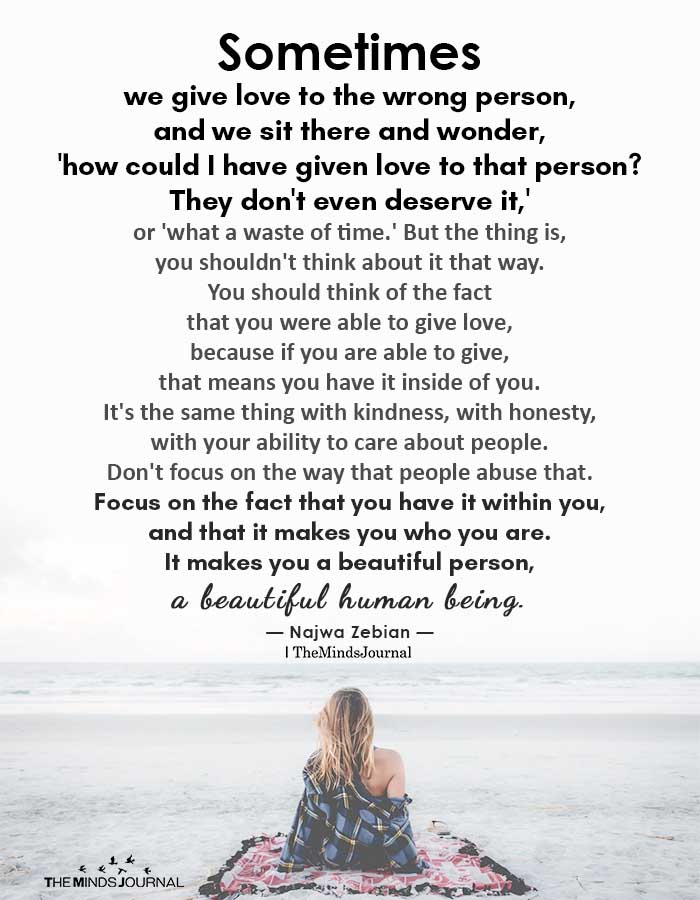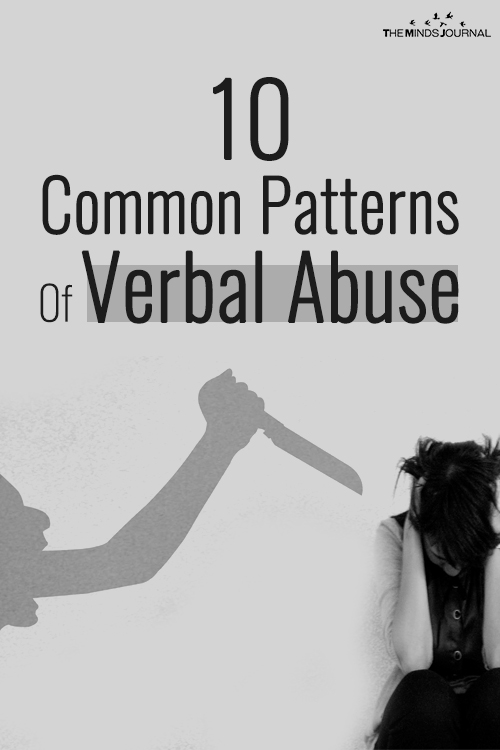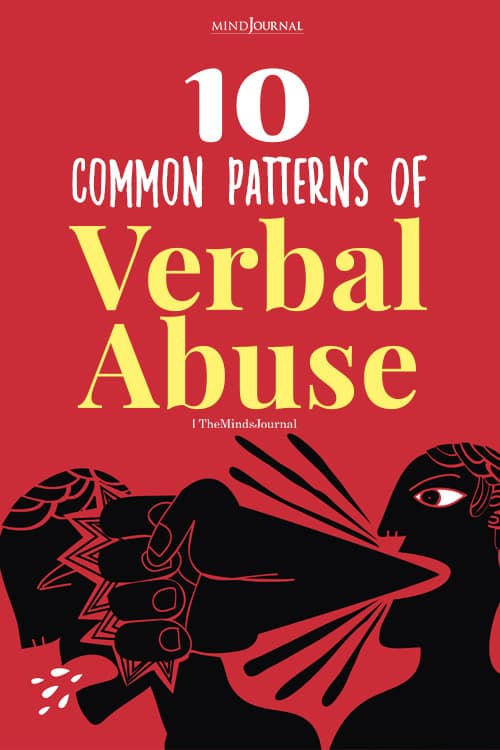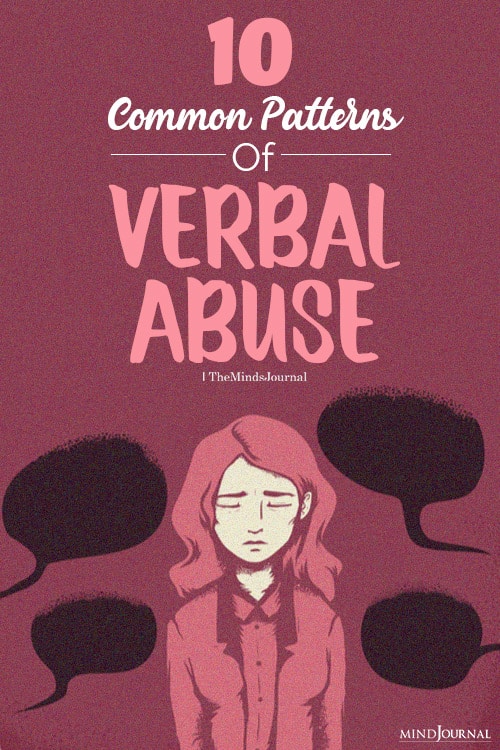Love is blind. In fact, it’s so blind that sometimes we can’t even see that we are in an abusive relationship. It can be hard for us to realize the fact that the person we love so much, can sometimes have some dangerous and awful qualities.
It seems unbelievable that the person we thought was so special and amazing could turn into someone so horrible in just a few minutes. But none of us are perfect. We all change and mature in different ways. Most of the time, a conflict can be sorted out with effective communication. But when you are in an abusive relationship, the best thing you can do is just leave. You should never be with a person who abuses you, whether physically or verbally.
Verbal Abuse Is Still Abuse

Abuse is not always physical or sexual in a relationship. When your partner constantly uses certain words to insult, demean, manipulate, dominate you, and even make you afraid of them, then they are verbally abusing you. In fact, there are different patterns of verbal abuse that can make it harder for the abused to identify it.
Abuse comes in many forms, not all of which are physical. When someone repeatedly uses words to demean, frighten, or control someone, it’s considered verbal abuse. It can happen in all types of relationships, whether it’s a romantic or parent-child relationship or even a professional one. Verbal abuse can severely affect your mental and emotional health and also lead to other health issues. Irrespective of what you think your fault may be, no one deserves to be abused.
Related: The Signs of Verbal Abuse
Is It Verbal Abuse Or Just An Argument?
Arguments happen in all relationships. That’s normal and healthy. We scream and shout, we fight and we may even say some mean things. But then we apologize and try to make things better. However, when you constantly feel down due to your partner’s words and it affects your self-esteem, then it is verbal abuse. That is not normal.
Here are a few red flags which can tell you that you are being verbally abused.
1. They humiliate and insult you repeatedly. They may later say it was all a joke and you are being too sensitive about it.
2. You are screamed and yelled at repeatedly by your partner.
3. You suddenly find yourself in an argument and get accused of starting it even though you didn’t.
4. The arguments lead to earlier unrelated issues or mistakes committed by you and make you defensive.
5. They act like the victim and put all the blame on you. You feel guilty every time.
6. They can be very socially charming but behave very aggressively with you in a private space.
7. They try to control your decisions and intrude on your personal space.
8. They act very aggressively and show tendencies of getting violent, but they never hit you. They act like they did not misbehave as they haven’t hurt you physically.
If you are unsure whether your partner abuses you verbally or if it is just a normal argument, then these 10 most common patterns of verbal abuse will help you find some clarification:
10 Common Patterns Of Verbal Abuse

1. Name-Calling
Are you addressed with insulting names by your partner? If your partner or family member shouts aggressive phrases while talking to you, then you are certainly being abused verbally. This is not a healthy way of communication in any relationship. In an abusive relationship, your partner will hurl insulting names at you until you comply with their demands. They may even just joke about it by calling you humiliating pet names every day.
Example:
- “Oh, you are just too dumb to understand anything.”“
- This is the reason why everyone thinks you’re an idiot.”
2. Patronizing Attitude
Having a condescending attitude is another form of verbal abuse. They will communicate with you in a sarcastic tone all the time and will be patronizing and disdainful. They will belittle you by making jokes and feel superior about it.
Example:
- “You sure you want to go out without makeup? What if your friends see you like this?”
- “If you keep eating like that you will always be crying about your weight. Geez!”
Related: Covert Verbal Abuse: Passive Aggressive Behavior That Aims to Control You
3. Criticism
Constructive criticism from your partner is always acceptable as it will help you grow. But when you face constant criticism and it eats away your self-esteem and sense of self-worth, then it is one of the patterns of verbal abuse.
Example:
- “If you can’t even do this properly, I don’t know what you will do in life.”
- “You’re so confused. I can always count on you to screw up everything. Thanks for ruining my day again!”
4. Degrading Comments
An abusive partner will always find a way to demean you with their words. They will make you feel bad by humiliating you and breaking your self-confidence. By using unhealthy and demeaning comments about your life, background, and family, they will break your spirit. And they will do this repeatedly.
Example:
- “You are nothing without me. You will be ruined if I left you.”
- “Stop being a sad sack of tears. No wonder no one wants to be with you.”
5. Manipulation and Threats
It is never easy to know when you are being manipulated. It is certainly one of the most common patterns of verbal abuse and you won’t even realize it. They will use their words smartly to manipulate you, control you and divert your attention from their true intentions. Sometimes they can say nice things that you want to hear from your partner. While other times, they may blackmail you emotionally or make threats to make you comply.
Example:
- “If you truly love me, then prove it. Do what I asked you.”
- “If you don’t want to see me hurt myself, then close the door and go back to your room. We need to talk.”
6. Blame
Your abuser will often blame you verbally for the mistake they make. You will start thinking that their abusive words are a consequence of your behavior. They will never take any responsibility and you will end up believing that you are making them feel bad through your actions.
Example:
- “Why do you always have to make me shout? You love making me the bad guy and playing the victim.”
- “I don’t want to do this. But you never leave me a choice.”
Related: Verbal Abuse Disguised as Jokes: When The Joke Isn’t Funny
7. Accusations
Accusations are another common form of verbal abuse. Stemming mostly from jealousy, your abuser will accuse you of doing things wrong and making you feel guilty about it. It will make you question your actions and lose confidence. This will not only affect your behavior and thoughts but also prevent you from doing what you actually want to.
Example:
- “I know you are cheating on me. I saw they way you guys were talking.”
- “Why can’t you give me your smartphone if there is nothing inappropriate?”
8. Withholding
Sometimes refusing to talk can also be a form of verbal abuse too. They will give you the silent treatment, refuse to receive your calls, refuse to look at you or even sit in the same room. This is called withholding and is used to make you put an effort to get your partner’s attention. You will be completely ignored for no apparent reason.
Example:
- You want to watch a romantic movie, but your partner only wants to see the new action thriller. When you disagree, they will refuse to go and leave the house. They won’t talk to you until you make amends.
9. Gaslighting
One of the most familiar patterns of verbal abuse, gaslighting is a manipulative and discreet strategy that is employed systematically. It will make you question your own thoughts and emotions. You will be compelled to apologize for mistakes that you didn’t even commit. You will feel isolated and become highly dependent on your abusive partner.
Example:
- “Are you crazy? When did that happen? You’re imagining things.”
- “Do you have to be so sensitive to everything all the time?”
10. Circular Arguments
Your abusive partner will keep arguing with you about the same issues and the arguments will go around in circles without reaching a meaningful conclusion. You will end up feeling tired and exhausted. You will wonder what issues to avoid when talking to your abuser just to escape another episode of the same argument over and over again.
Example:
- Your partner keeps talking about getting married, even though you told them you are not ready.
- Every time you are late for work, your ability to be responsible and discipline is questioned.
What Can You Do?
No. There is no one-size-fits-all answer here. Just follow your instincts, if you are unsure about whether you are being verbally abused or not. These patterns mentioned above will help you identify verbal abuse. But you will need to decide how you will cope with it.
Related: The Connection Between Verbal Abuse And Anxiety (That No One Talks About)
As this is a very personal issue, it will require a personalized solution. If you are keen on reasoning with your abusive partner, then it won’t work. They will only find faults in your reasons and will lead to more arguments. You cannot control how they will behave and you are not responsible for it either.
1. Start by creating boundaries to protect yourself.
2. Do not engage in unnecessary arguments. Simply stop responding to abuse.
3. Stop interacting with them as much as possible. Avoid them whenever you need to.
4. Finally, when you feel like it, leave. Break it up and cut all contacts with them when you are ready.
5. You can also join a support group or speak with a counselor for some other perspective on your situation.
It may take some time for you to get yourself out of an abusive relationship. Once you start the healing process, make sure you are surrounded by caring and supportive family members & friends. But most of all, have a positive outlook on life and have the strength to move forward and create a better life for yourself.













Leave a Reply